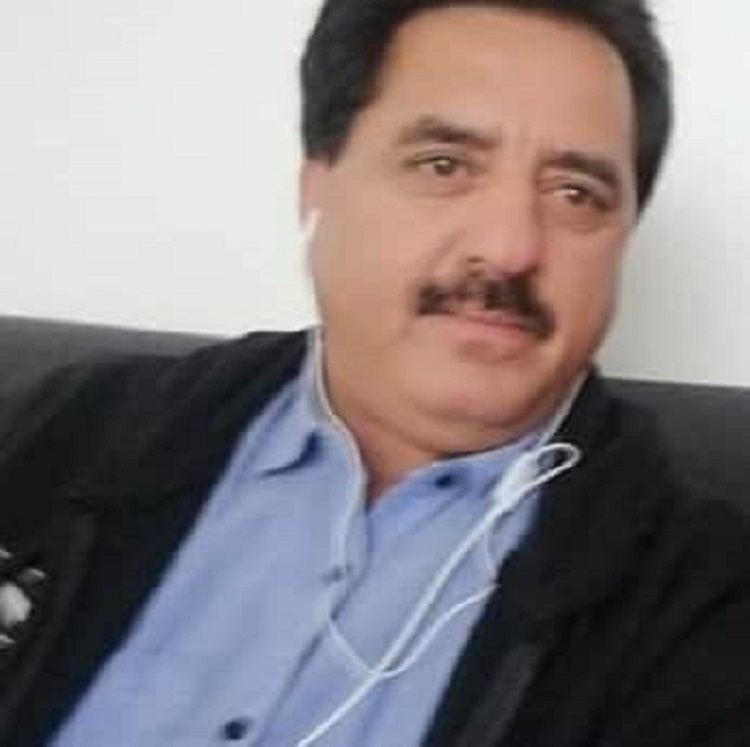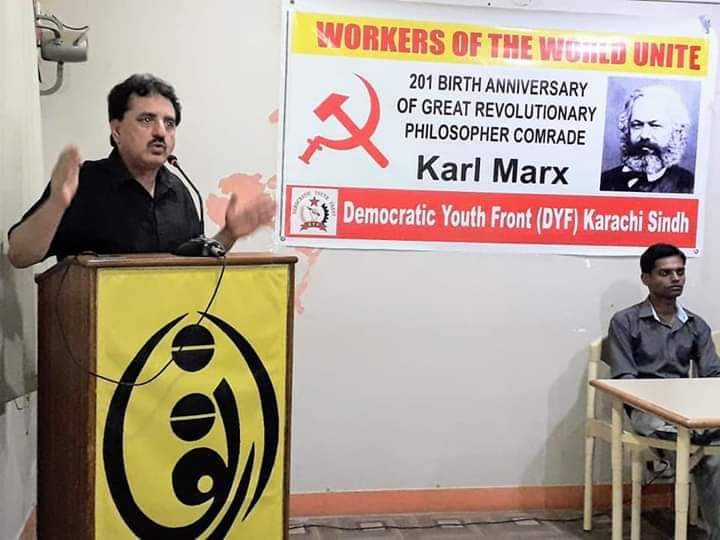
Habib-ur-Rehman is the former Spokesperson and Information Secretary of the Jammu Kashmir People’s National Party (JKPNP), the political outfit based in Pakistan-occupied Kashmir and Gilgit-Baltistan. JKPNP is struggling for the independence of POK and Gilgit-Baltistan from Pakistan. A member of the central committee of JKPNP, Habib-ur-Rehman spoke to Vivek Sinha, Editor-in-Chief News Intervention and Dosten Baloch, Editor-in-Chief Sangar Media Group about Pakistan’s illegal occupation of “Azad Kashmir” and Gilgit-Baltistan.
Vivek Sinha/ Dosten Baloch: When was Jammu Kashmir People’s National Party (JKPNP) formed? Why is Pakistan rattled due to the formation of JKPNP?
Habib-ur-Rehman: The Jammu Kashmir People’s National Party (JKPNP) was formed in April 1985. Before that the Pakistan-occupied Azad Jammu & Kashmir and Gilgit-Baltistan were dominated by the Pakistani-imposed rhetoric that these areas of the state are free and the Muslim population of ‘Srinagar Valley’ remained to be liberated.
In other words, the Pakistani state was trying to further its expansionist ambitions by distorting history to further consolidate its occupation and by besieging the so-called “Azad Jammu & Kashmir” and “Gilgit-Baltistan” for its political, social and economic purposes and this remains till today.
In such an atmosphere of oppression, the Jammu Kashmir People’s National Party clarified the difference between freedom and slavery. The Jammu Kashmir People’s National Party publicly announced that Jammu & Kashmir and Gilgit-Baltistan are under the control of Pakistan and these areas are occupied. One slave cannot set another free unless he breaks his own chains.
Therefore, the people of so-called ‘Azad Jammu and Kashmir’ and Gilgit-Baltistan have to fight for their real and true freedom against the occupation of Pakistan. This statement frightened the occupying rulers. This statement of the party was obviously not to be tolerated by the occupying state of Pakistan, and so they used all the tactics including terror, threatening, accusations through their local agents and intelligence agencies so that these real questions could not be raised. This statement of the party is clearly a challenge to the Pakistani occupation.
Vivek Sinha/ Dosten Baloch: What are the conditions in Pakistan-occupied Kashmir? Please elaborate…
Habib-ur-Rehman: Azad Kashmir and Gilgit-Baltistan are completely under occupation. And the lives of the people living under occupation are always destroyed. Every step the occupier takes, it takes with the intention to make people more and more helpless. The social, economic and cultural structure of Azad Jammu Kashmir and Gilgit-Baltistan has been completely dismantled.
False and distorted ideologies are being imposed in the name of religion to destroy our civilization, culture, language and traditions, which has given rise to psychological deprivation. There are restrictions on those who speak out for freedom and a separate state. Reading history books is forbidden. Everyone is sworn in to join Pakistan.
All the resources are under the direct control of Islamabad. Even, all small and big electric power projects which are in Azad Jammu & Kashmir and Gilgit-Baltistan are under the control of Pakistan. All the production in the area is in their possession and locals have nothing to do with it.
Azad Jammu Kashmir and Gilgit-Baltistan are practically turned into military bases. Before entering and leaving every district and city, there are military camps that apparently do nothing but are a symbol of fear that are used to suppress any future movement. The people are constantly living in despair, humiliation, uncertainty and slavery.
Vivek Sinha/ Dosten Baloch: Your struggle in POK is against Islamabad or the regime in Muzaffarabad?
Habib-ur-Rehman: Our struggle is not against anyone, but we are fighting for our freedom. This war of independence is mainly against the occupiers. Our land and our people have been disgraced. We are fighting for a dignified life and against humiliation, so this struggle is a challenge to the occupation of Islamabad. The poor people of Muzaffarabad are dumb and loyal servants who only breathe for their existence.
Vivek Sinha/ Dosten Baloch: Do you want freedom from Pakistan?
Habib-ur-Rehman: We demand the return of our occupied state. Since we are in control of Pakistan, so our demand is the withdrawal of Pakistani troops from this side of the state.

Vivek Sinha/ Dosten Baloch: You talk about Marxism and Socialism but this ideology and their slogans are dying across the world. How do you justify your struggle in this perspective?
Habib-ur-Rehman: Marxism not only recognizes the liberation movements around the world but also gives them unlimited and unconditional right to self-determination. Therefore, when a nation fights for its sovereignty, Marxism contributes to the movement and intensifies the struggle. The collapse of the Soviet Union is not an argument for the end of oppression and exploitation in the world.
Nationalism is not an ideology but a natural passion of patriotism that every person has for his motherland. After taking control of one’s homeland, socialism is the only way to create a new society by providing economic prosperity.
Vivek Sinha/ Dosten Baloch: Mao Zedong’s China is a socialist economy. How does your political movement see China?
Habib-ur-Rehman: China’s growing power is causing many significant changes in the region. A new balance of regional power is emerging. The state of Azad Kashmir is directly occupied by Pakistan. An important question that arises now is how to fight against a third country while already under the control of a powerful country.
Considering China’s growing economic power, the nations which are fighting for liberation in the region need to adopt a strategy that will persuade China to support these movements because it is difficult to fight at all fronts.
International tensions between the United States and China will push these movements into a single camp with far-reaching negative consequences and will not be very beneficial for the liberation movements.

Vivek Sinha/ Dosten Baloch: Don’t you think Nationalism is a better ideology than Socialism…for instance, raising your voice against atrocities on Kashmiris and other ethnic groups of the region?
Habib-ur-Rehman: As I have mentioned above, every socialist must be a patriot, but not every nationalist has to be a socialist. The experiments of history show us that nationalism enters into a narrow alley, where it becomes an instrument of exploitation at the hands of exploitative forces, so caution and responsibility are necessary, not as an emotional state and immediate reaction but being far-sighted, and then a collective wisdom is needed.
The state of Jammu and Kashmir is a multi-ethnic and multi-religious state inhabited by people of different nationalities, religions, cultures and languages. The common struggle of all of them is the guarantee of true freedom. The Jammu Kashmir People’s National Party (JKPNP) has always been struggling unitedly and jointly with oppressed nations such as in the form of PONAM (Pakistan Oppressed Nations Movement). We believe a strong and long-term unity among the like minded movements are important for any struggle.
Vivek Sinha/ Dosten Baloch: How will you define Pakistan’s barbarism in Kashmir?
Habib-ur-Rehman: Occupier always commits barbarism and destroys everything from individual life to collective life which I have already mentioned. In brief they are intimidating, threatening, killing, indulging in forced migrations and enforced disappearances. These are the basic principles of fascism. The people of J&K and Gilgit-Baltistan are suffering the same treatment by Pakistan, against which an indigenous struggle is going on, although it is still very weak.
Vivek Sinha/ Dosten Baloch: Baba Jan who raised his voice for the people of Gilgit-Baltistan has been jailed by Pakistan. Why is it that you and your party has been silent on Baba Jan’s illegal detention by Pakistan?
Habib-ur-Rehman: We have been regularly raising our voice against the sentence of Baba Jan, Iftikhar Karbalai and their associates. We have also launched the Worldwide Free Baba Jan Campaign. In July 2015, there were protests all over the world from the platform of Jammu Kashmir People’s National Party.
Vivek Sinha/ Dosten Baloch: Why is it that Indian communists never talk about your struggle and have remain silent even about the jail term of Baba Jan, who is a communist himself?
Habib-ur-Rehman: The Indian Communists do not go beyond the wishes and interests of the Indian state as they have made many compromises with the state, and are losing their prestige by going into parliamentary politics.
When a movement or ideology is silent or compromises on the basic principles, history throws it to the depths. However, the emerging left-wing movements in India seem better and more radical, which may play a better role in the future.
Vivek Sinha/ Dosten Baloch: CPEC bears the stamp of China’s expansionist policy? Do you think the people in POK and Gilgit-Baltistan will be adversely affected due to CPEC? If yes, then how do you plan to oppose CPEC?
Habib-ur-Rehman: The CPEC project will definitely have an impact. Its first door of the entrance is from Gilgit-Baltistan, part of our state. Weak political discourse will affect oppressed nations.
Vivek Sinha/ Dosten Baloch: What is People’s National Alliance (PNA)? It’s being said that Pakistan’s ISI has infiltrated PNA and also does some kind of funding…?
Habib-ur-Rehman: The People’s National Alliance (PNA) is an alliance of various groups and parties that demand a dignified and empowered government and parliament with more powers in Pakistani-occupied Muzaffarabad and Gilgit-Baltistan. In such alliances, there are always people from the intelligence agencies, and even in this alliance there might be people from intelligence, although they cannot be identified yet.
If this alliance gains more political power and more clarity, then it is easier to identify such people.
However, differences in the alliance and an attitude of disorganization does exist, it appears that some people; certainly, the leftist and nationalist mindset are sabotaging the alliance by trying to discredit this alliance in the guise of nationalism. But in terms of aim and stance, the PNA is clearly in a solid and correct position. To maintain and improve this alliance, it is possible to avoid the intelligence agencies by staying alert and being far-sighted otherwise, it will end. As far as funding for PNA is concerned, this is not true at all that PNA gets funding from anyone.
Vivek Sinha/ Dosten Baloch: Don’t you think that people of Gilgit-Baltistan and POK should resort to armed struggle?
Habib-ur-Rehman: The people of Pakistan-occupied Jammu and Kashmir and Gilgit-Baltistan have been pursuing a constant political resistance movement for control of their land and resources, which is part of a broader democratic struggle. Armed struggle, as a premature and emotional reaction, does less good and more harm to the movement.
A widespread public political struggle is a guarantee of a resistance movement for which we are still in the early stages. There will come a phase of the people’s armed struggle which is vital for the oppressed nations.
Vivek Sinha/ Dosten Baloch: Balochistan is fighting against Paksitan’s atrocities. How do you see the freedom struggle of Balochistan?
Habib-ur-Rehman: The struggle of the Baloch people is a struggle for freedom based on justice and we are with the Baloch people in their righteous fight. And we hope that while we stand with them firmly, the Baloch nation will also be supporters and helpers of our real liberation movement. At present we can call the Baloch movement the strongest anti-imperialist and pro-people movement in the region.
Vivek Sinha/ Dosten Baloch: Do you think the oppressed communities in Pakistan and in the Pakistan occupied regions must form a joint front to fight for their struggle?
Habib-ur-Rehman: The oppressed and the enslaved always need a joint struggle. All the oppressed nations and communities of the region must work together to move forward. We would welcome any kind of unity of the oppressed nations in the region, even in the past, we have been in close contact within the form of PONAM (Pakistan Oppressed Nations Movement) alliance. We have been and will continue to be involved in the common political struggle.
Vivek Sinha/ Dosten Baloch: Do you believe that Kashmir can attain freedom from Pakistan?
Habib-ur-Rehman: Yes, you can be free, but you have to do a long and lengthy struggle, there is no shortcut.
Vivek Sinha/ Dosten Baloch: What kind of atrocities are committed by Pakistanis on the Kashmiris living in Pakistan occupied Kashmir?
Habib-ur-Rehman: I have mentioned this in detail above, the people living under siege have no opinion of their own, no status what could be more barbaric than that? Those who see and feel cannot speak or raise questions. The label of anti-Islam and traitor should be attached to every person who shows love for his land and his people.
